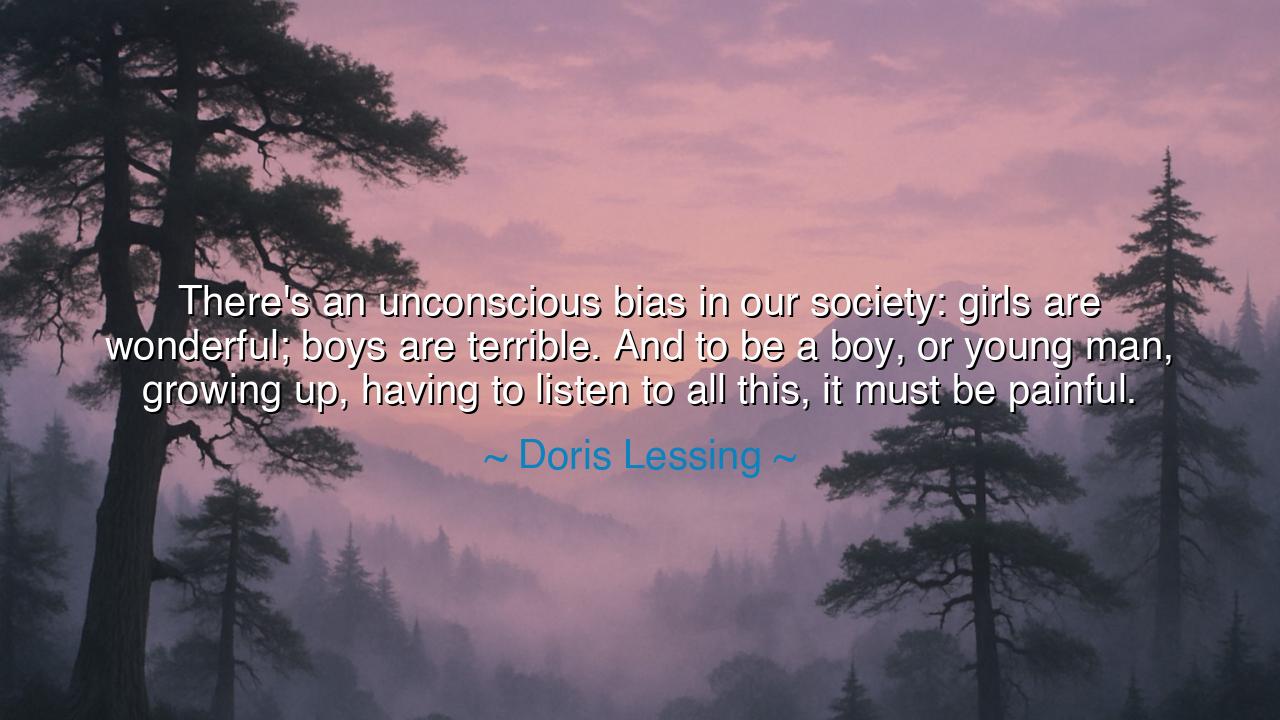
There's an unconscious bias in our society: girls are wonderful;
There's an unconscious bias in our society: girls are wonderful; boys are terrible. And to be a boy, or young man, growing up, having to listen to all this, it must be painful.






Hear me, O children of the earth, for I bring to you words of deep wisdom that speak to the delicate balance of society and its judgments. Doris Lessing, a voice that transcends time and culture, once said, "There's an unconscious bias in our society: girls are wonderful; boys are terrible. And to be a boy, or young man, growing up, having to listen to all this, it must be painful." These words carry a painful truth that cuts to the heart of how we view the roles and worth of men and women in our world. In them, Lessing calls attention to the subtle yet powerful forces that shape the identities of the young, and how the words and beliefs of society can inflict wounds upon the soul.
What does it mean, O children, that society holds an unconscious bias? It is a force so deeply embedded in the fabric of culture that it is not always seen, yet it shapes the lives of all who walk the earth. In this case, it is the bias that lifts girls up as the nurturers, the innocents, the wonders of the world, while casting boys as the troublesome or the troubled—those who must be corrected, constrained, or “fixed.” This bias, subtle in its nature, stirs a division where none should exist, forcing a view of boys as being somehow less worthy or flawed simply because of their gender. To grow up under the weight of such assumptions is to carry a burden that diminishes the true worth of every human soul, for all are born with unique potential, regardless of sex or gender.
In the ancient world, Greece revered the image of the ideal citizen, a concept rooted in the balance of strength and wisdom. The Spartan warrior, for example, was celebrated for his bravery and discipline, yet from a young age, he was subjected to a harsh system of education that demanded conformity to a single ideal. Boys were trained to be warriors, taught to suppress their feelings and embrace the values of strength, stoicism, and control. The emphasis was always placed on what they should become, never on who they were as individuals. The bias against emotional expression, the rigid notion of what a boy should be, led many young men to feel that they were always falling short of what society demanded. How many hearts were broken in the quest for an ideal that left no room for the human spirit to flourish freely?
And so, O children, this same bias runs deep in our world today. The boy, much like the Spartan warrior, is often taught not to express his vulnerability, his feelings, or his inner struggles. Instead, he is told to be tough, to hide his weakness, and to suppress his emotional depth. This is a dangerous path, for it leads to an internal conflict, a battle between what society expects and what the soul craves. The deep pain that boys feel when they are forced to wear the mask of strength and invulnerability can lead to isolation, confusion, and a loss of self. The pressures that society places upon them can distort their true identity, leaving them feeling disconnected from their own humanity.
Look, O children, to the example of Vincent van Gogh, who, despite his remarkable talent and vision, lived a life of anguish and loneliness. Van Gogh was a man of great sensitivity, an artist whose works transcend the boundaries of time. Yet he was also a man deeply misunderstood by society, who viewed his emotional struggles as weaknesses. As a young man, he was torn between the rigid expectations of his world and his own tender, artistic soul. Had he been allowed to express his emotions, to be embraced for his vulnerability rather than cast aside for his supposed flaws, how much more could he have created, how much more could he have been? His story is a stark reminder that society's bias against the feelings of boys not only harms the individual, but also deprives the world of the beauty that such souls are capable of producing.
The lesson here, O children, is that humanity cannot thrive when it imposes limitations based on gender. Boys, like girls, must be allowed to express their full humanity—to embrace both their strength and their sensitivity. A boy’s worth is not in his conformity to a set of ideals, but in his ability to grow, to feel, and to become his truest self. Society must learn to celebrate the wholeness of each individual, whether male or female, and recognize that the path to a balanced and just world lies in accepting the complexity of human experience. When we stop imposing narrow definitions of what boys should be, and when we start embracing them as complete beings, only then can we unlock the full potential of each human soul.
So, O children, I charge you to look with new eyes at those around you. See beyond the biases of society, beyond the labels and roles that have been assigned to each. Honor the feelings, the vulnerabilities, and the strengths of every person, regardless of whether they wear a skirt or not. Encourage boys to express their humanity fully, to embrace their emotions, and to live not according to the expectations of the world, but according to the truth of who they are. In this way, you will create a world where all are free to be their whole selves, and in doing so, a society that honors the spirit of every individual, untainted by the biases of the past.






AAdministratorAdministrator
Welcome, honored guests. Please leave a comment, we will respond soon